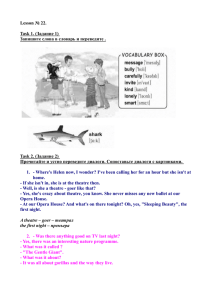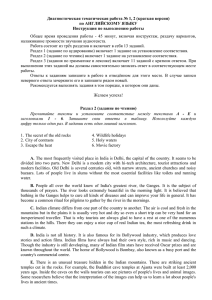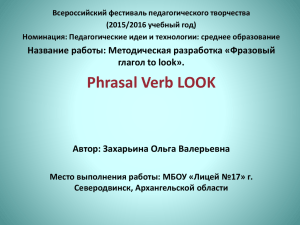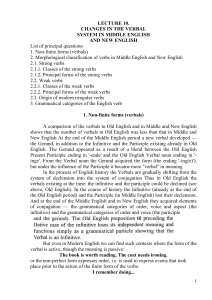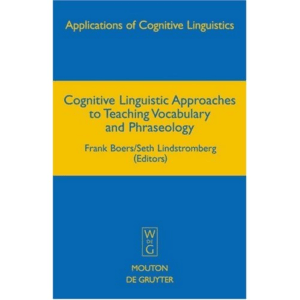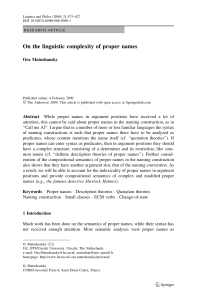Патрова Людмила Фразовый глагол: друг или враг
реклама
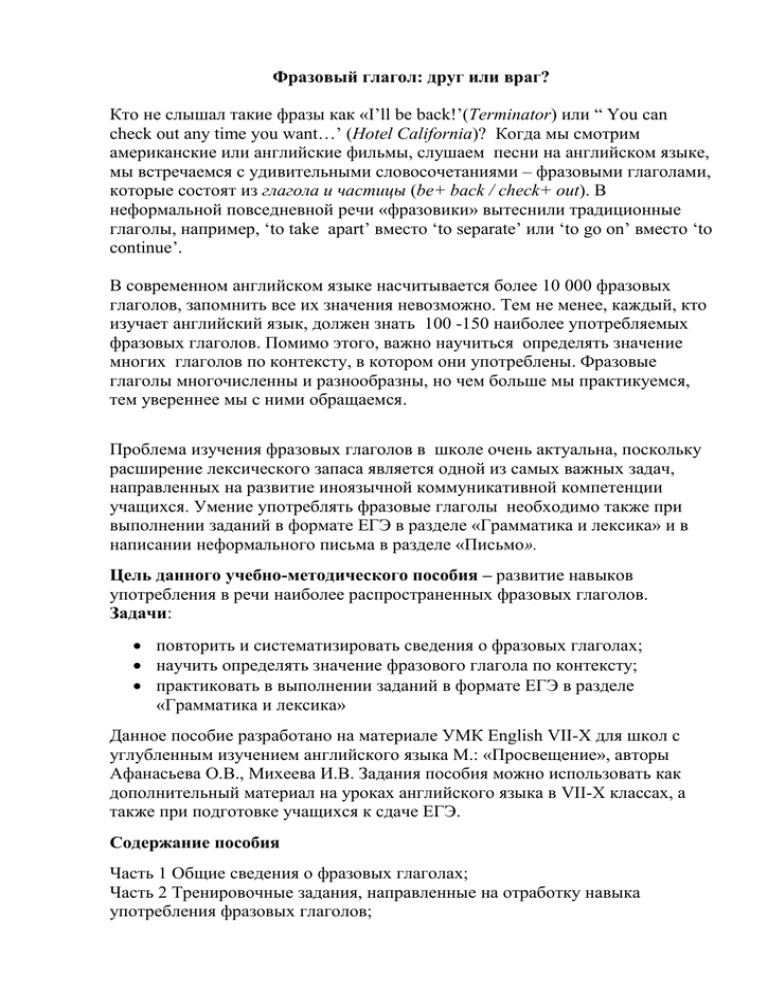
Фразовый глагол: друг или враг? Кто не слышал такие фразы как «I’ll be back!’(Terminator) или “ You can check out any time you want…’ (Hotel California)? Когда мы смотрим американские или английские фильмы, слушаем песни на английском языке, мы встречаемся с удивительными словосочетаниями – фразовыми глаголами, которые состоят из глагола и частицы (be+ back / check+ out). В неформальной повседневной речи «фразовики» вытеснили традиционные глаголы, например, ‘to take apart’ вместо ‘to separate’ или ‘to go on’ вместо ‘to continue’. В современном английском языке насчитывается более 10 000 фразовых глаголов, запомнить все их значения невозможно. Тем не менее, каждый, кто изучает английский язык, должен знать 100 -150 наиболее употребляемых фразовых глаголов. Помимо этого, важно научиться определять значение многих глаголов по контексту, в котором они употреблены. Фразовые глаголы многочисленны и разнообразны, но чем больше мы практикуемся, тем увереннее мы с ними обращаемся. Проблема изучения фразовых глаголов в школе очень актуальна, поскольку расширение лексического запаса является одной из самых важных задач, направленных на развитие иноязычной коммуникативной компетенции учащихся. Умение употреблять фразовые глаголы необходимо также при выполнении заданий в формате ЕГЭ в разделе «Грамматика и лексика» и в написании неформального письма в разделе «Письмо». Цель данного учебно-методического пособия – развитие навыков употребления в речи наиболее распространенных фразовых глаголов. Задачи: повторить и систематизировать сведения о фразовых глаголах; научить определять значение фразового глагола по контексту; практиковать в выполнении заданий в формате ЕГЭ в разделе «Грамматика и лексика» Данное пособие разработано на материале УМК English VII-X для школ с углубленным изучением английского языка М.: «Просвещение», авторы Афанасьева О.В., Михеева И.В. Задания пособия можно использовать как дополнительный материал на уроках английского языка в VII-X классах, а также при подготовке учащихся к сдаче ЕГЭ. Содержание пособия Часть 1 Общие сведения о фразовых глаголах; Часть 2 Тренировочные задания, направленные на отработку навыка употребления фразовых глаголов; Часть 3: Тренировочные задания, организованные по темам; Часть 1 Общие сведения о фразовых глаголах Что такое фразовый глагол? Как уже упоминалось выше, фразовый глагол – это устойчивое сочетание ГЛАГОЛ + ЧАСТИЦА (предлог и/или наречие). Большинство фразовых глаголов состоят из двух слов, например, give up, go ahead, go away. Однако существуют и трехсловные глаголы, например, look forward to, get on with, run out of . Иногда значение фразового глагола можно определить по смыслу глагола или частицы, например, come+in, go+ away, check+ in/out. Однако чаще всего, их значение определяется только по словарю, например, see off – провожать, look forward to – ждать с нетерпением. Многие фразовые глаголы имеют своих «друзей - компаньонов», например, switch on/ off the light/ TV/ a computer, take up a hobby/ sport, come across an old friend/ photo. Такие глаголы называются переходными (transitive verbs). Известно, что переходными называются глаголы, которые употребляются с прямым дополнением, в отличие от непереходных глаголов (intransitive verbs), которые не имеют прямого дополнения. Названные выше глаголы take up, switch on/off, come across являются переходными, поскольку имеют прямое дополнение. Примером непереходных глаголов могут служить глаголы get up, set off , которые не употребляются с прямым дополнением. Например, I usually get up at 6. We set off up the mountain in the morning. Если же фразовый глагол является переходным и употребляется с прямым дополнением, возникает вопрос, возможен ли иной порядок слов в предложении или нет? Когда мы можем употребить дополнение между глаголом и частицей? Например, можно сказать: She turned down the volume. She turned the volume down. She turned it down. Однако мы нельзя изменить предложение I’m glad that I bumped into you. Все дело в том, что глагол bumped into является неразделяемым (inseparable), и мы не можем поставить дополнение между глаголом и частицей. Глагол turn down является разделяемыми (separable), т.е. мы можем поместить дополнение либо после частицы, либо между глаголом и частицей. Однако если дополнение выражено местоимением, то оно ставится только между глаголом и частицей. Узнать, является ли фразовый глагол разделяемым или неразделяемым можно лишь в словаре. Итак, чтобы правильно употреблять фразовые глаголы, мы должны: 1. выбрать правильные частицы; 2. подобрать слова или фразы, которые образуют подходящий контекст; 3. определить, где ставится прямое дополнение, если таковое имеется; Совет №1 Выбор частицы Важно правильно составить списки фразовых глаголов, например, можно сгруппировать глаголы по частицам, это помогает быстро определить и запомнить значение глаголов. in check on turn off turn up dress down be move switch switch speak come set put run wrap turn try take zip write Совет №2 Выбор контекста Лучший способ запомнить фразовые глаголы - это запоминание в контексте. Важно подобрать понятный контекст, можно составить диаграмму и/или придумать предложение, которое объясняет смысл глагола e.g. Don’t worry! Everything will turn out well. the chanсе down well on TV/computer/tap TURN out off Совет №3 Запомните порядок слов в предложениях с переходными фразовыми глаголами Ann turned on the shower. Ann turned the shower on. Ann turned it on. x Ann turned on it. Часть 2 Тренировочные задания, направленные на отработку навыка употребления фразовых глаголов В современных учебных пособиях можно найти большое количество разнообразных заданий для отработки навыков употребления фразовых глаголов в устной и письменной речи. Задания данного пособия составлены на материале УМК English VII-X для школ с углубленным изучением английского языка, авторы Афанасьева О.В., Михеева И.В. Задания в данной части пособия носят универсальный характер, их можно легко адаптировать к учебным материалам любой параллели. Задание № 1 Write down ‘forks’ to help you learn the meaning of the phrasal verb to get/to set/take/pull/etc. get on/off the bus/plane/… get into /out off …/… Задание № 2 bus Tick the correct space in the table. Write 4 sentences of your own using these verbs. bike train car plane taxi get on get off get into get out of Задание № 3 Look at the bubble network on p 34/309 (English VII). The verb is in the centre and surrounded by prepositions. Add new ‘bubbles’ for the objects which go with these verbs. Write or say 5-6 sentences with these verbs. Задание № 4 Look up the base verbs in the dictionary and write down all phrasal verbs from the entry. Study example sentences. Choose 5 phrasal verbs you want to learn and write the sentences of your own to make their meaning clear. Задание № 5 Make the bubble network for the phrasal verbs cut/carry/put/run/ etc. Choose 5 phrasal verbs you want to learn and write the sentences of your own to make their meaning clear. Задание № 6 Write two sentences for each of the phrasal verbs to show their different meanings: pick up/cut down/speak up/ put on/put up. Задание № 7 1. 2. 3. 4. 5. Complete the sentences in a logical way. When I saw Jim again he turned into… In the end, only ten bikers turned up for … It turned out that… Jack turned … upside down looking for… Mum asked me to turn … on/off/down/up. Задание № 8 Correct the mistakes. Be careful: some sentences are correct. 1. I’m going to pick up them after school. 2. He’s putting his boots on. (C) 3. Children should cut fast food down on. 4. Why do the teachers always pick on me? (C) 5. Have you already picked the costume out for the party? 6. Tanya picked a few Spanish words up while staying in Madrid. 7. Why should we put such behavior up with? 8. Don’t worry! We’ll speak you up for. 9. Don’t cut with your stupid remarks in! 10. Why did they put the meeting off? (C) Задание № 9 Fill in the gaps. Use the correct forms of the verbs: blow bring get give look pick run show take (x2) work break 1. Eventually we boarded and the plane… off. 2. Honestly, I’ve never … on with my elder sister. 3. Listen to this! Dad said he’d … up smoking two days ago. 4. Larry, who is going to … after your dog while you’re on holiday?! 5. When I was little my Granny … me up after school. My parents were busy. 6. Have you heard the news? The racing car …up and crashed into a tree. 7. When we were going to Moscow our car … down in the snowstorm. 8. Do you know that Dave’s grandfather … him up after his parents died. 9. Sorry, but we’ve …out of coffee. What about a cup of tea? 10. My elder brother is always … off on his skateboard. 11. My little sister … after Mum. They are both so cheerful. 12. Great! Our plan …out! Задание № 10 1. 2. 3. 4. 5. 6. 7. Choose the correct preposition. She waited until the footsteps had died down/out/away/over. Don’t worry, the gossip will soon die out/away/down/off. I’m dying on/to/for/of a cup of tea. They carried to/on/at/in until the work was done. Ann is very hard-working and it’ll carry her on/through/to/along. Despite very strong opposition they managed to carry their plan on/out/ in/to. It looks Jim will stick on/at/to/in his word this time. 8. The groom rubbed the horses down/off/along/out. 9. My sister and I rub on/along/in/out most of the time. 10.Sorry, it was a stupid mistake. Don’t rub it on/along/ in/to. Часть 3: Тренировочные задания, организованные по темам Задания в части 3 организованы по темам, изучаемым в 8-10 классах. Задания данного раздела можно использовать при повторении и закреплении ранее изученного материала. Задание №1 Shopping. Clothes (Form 8) Put the sentences into the logical order. The first one is done for you. a. b. c. d. e. f. g. h. i. He put his trainers back on. Jack went into the fitting room. – 1 He took off his shorts. He paid for the trousers. He tried the trousers on. He took them off. He took off his trainers. He went back to the shop girl. He put his shorts on again. Задание №2 Shopping (Form 8) What is your Shopping story? Write it in your notebook using the phrasal verbs. Задание №3 Travelling (Form 8) Look up the phrasal verbs in the dictionary and write your Travelling story (5-7 sentences): rush to/take off/stay in/ check in/check out/come back. Задание №4 The Life Of Teens. Extreme Sports (Form 9) Replace the verbs in italics with the phrasal verbs in the correct form. back out/ be into/ go through with/get across/take up/put on/set up/turn up I am a good mixer and make friends quite easily. Most of them are keen on extreme sports. I (1) really love all winter sports, so I decided to (2) start doing ice diving. When I (3) arrived for my first dive, I was very nervous. I tried (4) not to do it but my friends told me (5) to do it as planned. And I agreed! You must (6) wear a protective suit and spend a lot of time to (7) organise your equipment. But it’s worth waiting for. It’s impossible to (8) explain the excitement of ice diving! Keys: 1 – be into; 2 – take up; 3 – turned up; 4 – back out; 5 – go through with; 6 – put on; 7 – set up; 8 – get across; Задание №5 Family Life (Form 9) Make the dialogue less formal. Replace the underlined verbs with the phrasal verbs from the list below. Use them in the correct form. Then make up your own dialog with your partner and act it out. get along with / bring up / stand up for oneself /grow up / get on well with Victor: What a nice photo! How old are here, Carol? Carol: Just two years. Victor: And where did you live as a child? Carol: Well…I (1) spent my childhood in Newcastle. Look, this is our family photo, it’s our favorite. Victor: Oh, your parents look so serious. Were they strict with you? Carol: They (2) raised three children, my elder brothers and me, but our parents weren’t too strict with us. Victor: So your upbringing wasn’t strict, yeah? Carol: Well, we were always told not to be rude and have respect and so on, but I guess they wanted us to be able (3) to protect ourselves. Victor: Yeah, it’s really important in this world! So, what about your brothers? Do you have good relationships with them? Carol: Yes, we have a great time when we see each other. Victor: But what about when you were children? Did you fight? Carol: Sometimes of course, but even as children we (4) loved each other and used to play together a lot. Victor: Lucky you are! I didn’t (5) have good relationships with my brother. When we were children, we used to fight and argue about everything! Keys: 1 – grew up; 2 – brought up; 3 – stand up for ourselves; 4 – got along with; 5 – get on well; Задание №6 Family Life (Form 9) Write a paragraph about your family using the phrasal verbs from the previous exercise. Read your story to the class. Задание № 7 The Life Of Teens. Friends (Form 9) Describe how your friend has changed since you first met him/her. Use the following phrasal verbs: to give up/to set about doing something/to do away with something/to get over/to get down to/to turn into. Read your story to the class. Задание №8 Man the Believer/ Mysteries (Form 10) Write a paragraph/ story which ends with a phrase ‘It turned out that…’ Задание №9 Happiness and Success /Education (Form 10) Write down a paragraph about your English test /exam experience. Use the following phrasal verbs: to find out (information)/to put off (studying for a test/exam) / to go over (grammar/vocabulary) / to go through (exercises at home)/ to work out (mistakes)/ get through (a test/exam). Read your story to the class. Задание № 10 Ecology (Form 10) Read the text and decide which answer A, B, C or D best fits each space. I received a leaflet from Greenpeace about using less paper to save trees to cut Well, I'm sure some of the supporters of Greenpeace have good intentions. But the real agenda of Greenpeace isn't to save the planet. That is merely a convenient excuse to (1) … away your freedom and place all of the decision making into the (2)… of a few "enlightened" people that will tell the rest of us dumb masses what to do. They will decide how resources will be allocated, so don't question it if they need some trees (3)… to prevent you from doing it. This whole ‘save trees’ nonsense is as ignorant as saying “Save a corn stalk! Don't eat pop corn!’ If you took a (4) … across southern Arkansas, drove across Mississippi, Alabama and Georgia you would find that most of that land is covered in pine trees, specifically planted and managed for the production of paper. It is a renewable (4) … and pulp wood is grown and harvested just like other crops such as cotton, lettuce, corn, and wheat. The bottom line is they want the masses to live in grass huts with mud floors and spend our days hunting for roots and berries while they sit (5) … in 5000 sq ft houses directing our activities. 1 A get B pass C take D throw 2 A arms B hands C palms D fingers 3 A drive B pass C walk D move 4 A trees B forest C material D resource 5 A up B on C back D down Список использованной литературы и интернет ресурсов Longman Dictionary of Contemporary English Longman Essential Activator Longman Pocket Phrasal Verb Dictionary Афанасьева О.В., Михеева И.В. English VII-X для школ с углубленным изучением английского языка М.: «Просвещение» Michael Harris David Mower Anna Sikorzynska Upper Intermediate Longman Opportunities Intermediate/ http://www.funqa.com/environment-ecology/842-1-Environment-2.html
